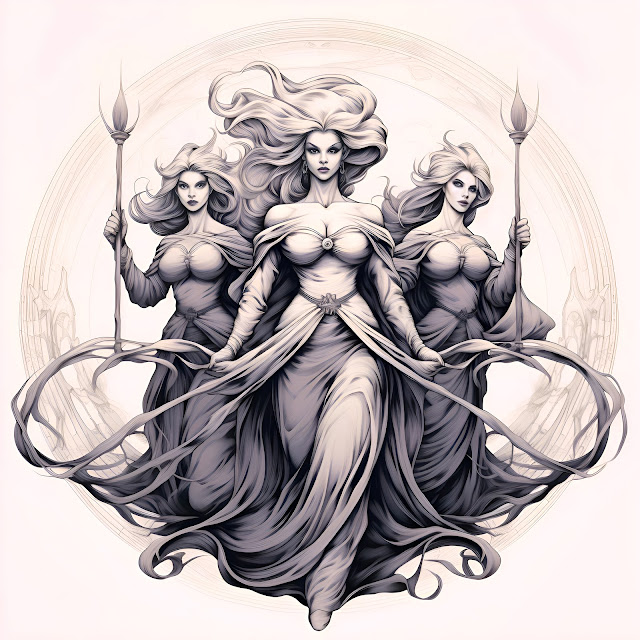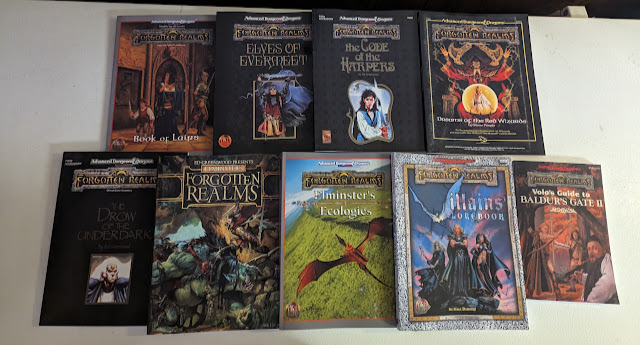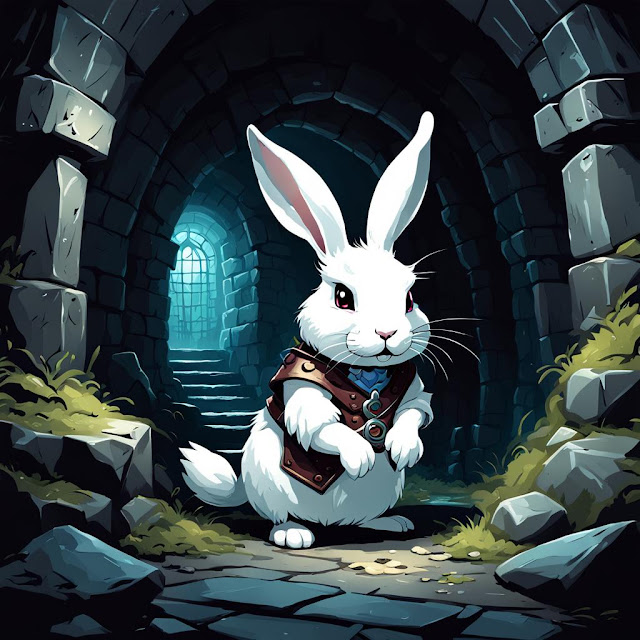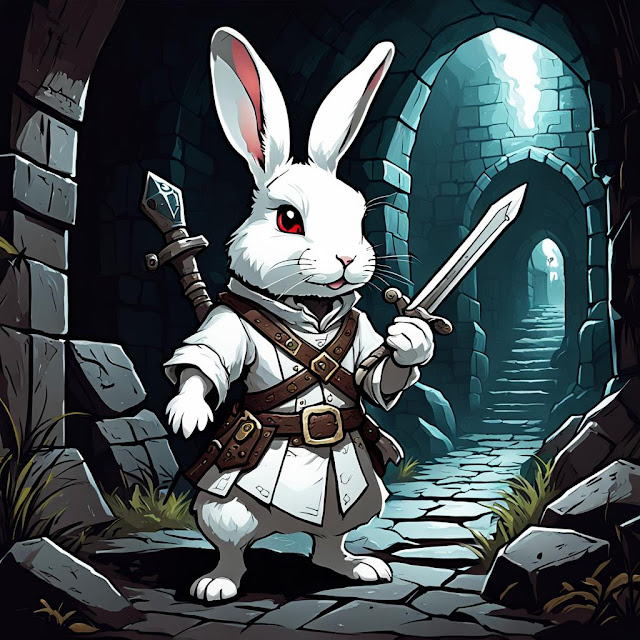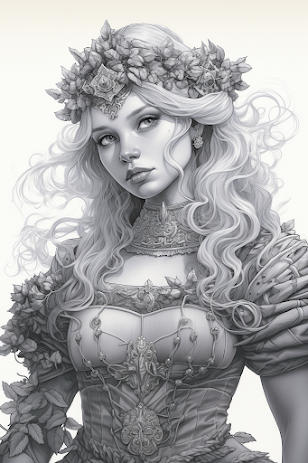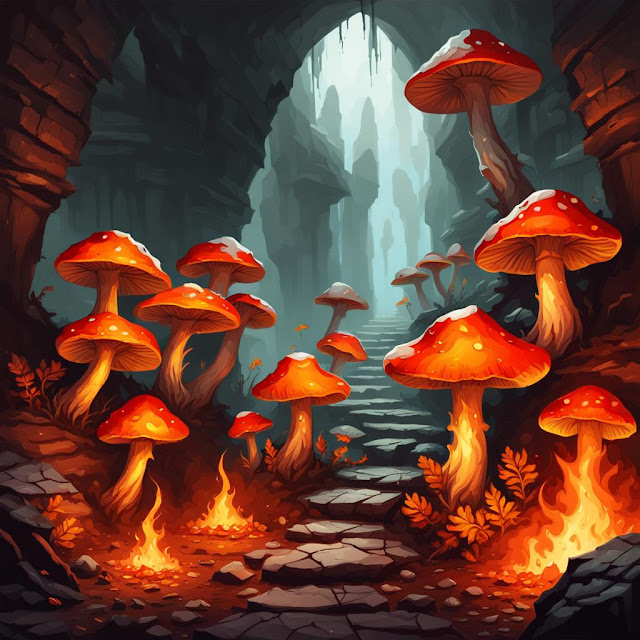I am now at my last set of gods (or whatever the Fates are), which brings me full circle. Today, I want to talk about the Fates.
When I began this project I talked about this book of mythology I had that had stories of the Greek myths, the Norse myths, and ending in Beowulf. In my young mind, these looked like a continuum, one set of tales flowed into the next. While age would teach me that these were separate myths, later age would also teach me they are still just one set of myths from an even older source (Proto-Indo-European, which I still want to tackle one day). But even way back then (I want to say 5th Grade) I saw the similarities between the Greek Fates and the Norse Norns. Three women, each representing the Past, Present, and Future, spinning, weaving, or otherwise looming the fate of humankind. Each person, from birth until death.
The image was powerful, and I was sure there was a connection between them. Even doing the briefest of surface research (ok, briefest of literature review. I am particular how people throw the word "research" around) one kind find similar beings all over the Earth and across time due to their PIE origins.
- Albanian: Fatia
- English: Wyrds
- Greek: Moirai
- Hinduism: Tridevi
- Hittite: Gulses
- Lithuanian: Deives Valdytojos
- Norse: Norns
Those are only the most obvious.
For my Pantheon here I want to include them. They were important to the Greeks and Romans in their guise of The Fates (Moirai) and very important in Norse myth. Indeed, in Norse mythology, every living creature had a corresponding set of Norns that measured out their fates.
I will also admit (and a little begrudgingly now) that some of my ideas of the Fates have also been colored by the Piers Anthony book series, The Incarnations of Immortality, with Book 3 With a Tangled Skein chief among them. The first five books were fun. The next two ok to falling apart at the end (it's like he had painted himself into a corner among other issues) and the last one? Well I have not read it despite owning it, I heard it was terrible.
Fata Norne
The Fates of the Black Forest Mythos are not gods in the traditional sense. They are immortal, or more accurately, unending. They often appear as three young, mature, and old women in similar aspects of the Maiden, Mother, and Crone, though that is not who they are. Instead, they are Future, Present, and Past respectively. They can also appear as three identical sisters of indeterminate age. It is their job to measure the fates of the Gods and Mortals alike. No one, not even the Gods, can escape their decrees. It has led to a saying, "Once Fate has spoken, it is so."
FATA NORNE
Eternals
ARMOR CLASS: 5
MOVE: 24"
HIT POINTS: 300 each
NO. OF ATTACKS: 1
DAMAGE/ATTACK: Special Only
SPECIAL ATTACKS: Decree of Fate
SPECIAL DEFENSES: See Below
MAGIC RESISTANCE: 100%
SIZE: M (5')
ALIGNMENT: Neutral
WORSHIPER'S ALIGN: None
SYMBOL: The faces of three women or a loom
PLANE: Erde (Prime Material)
CLERIC/DRUID: 15th level Cleric
FIGHTER: Nil
MAGIC-USER/ILLUSIONIST: 15th level Magic-user
THIEF/ASSASSIN: Nil
MONK/BARD: 10th level Bard
WITCH/WARLOCK: 15th level Witch
PSIONIC ABILITY: II
S: 23 I: 25 W: 25 D: 16 C: 24 CH: 10
Fata Norne, the Fates, are the goddesses in charge of all fates, from the lowest vermin to the mightiest gods. They do not interact with mortals save in the direst of circumstances. They avoid direct contact with the other gods; likewise, the gods avoid and possibly fear them.
If the Fates are encountered, they need a mortal agent of fate to complete some quest. They will give this mortal what they need but no more than that. It is assumed that since they know all creatures' fates, their choice is correct, but that is not the same thing as the mortal succeeding or even living through the quest.
If anyone is foolish enough to attack the Fata Norne, they can pass the Decree of Fate. Which removes the threat permanently. They decree that the attacker was never born and they cease to exist; no saving throw is permitted. In some cases, the offending mortal (or god) is instantly replaced with an alternate version who lived the same life but was not as foolish as to attack them.
They can't be hit by normal weapons; even magic is ineffective. In addition to the radical removal of the offending attacker from all existence, they can, more simply, remove their attacker's knowledge of whatever magic they would use to attack.
At their choice, they can cast spells as a 15th-level spell caster, either as a Cleric, Magic-user, or Witch.
No one worships the Fata Norne, and they do not grant spells to clerics.
--
There you have it! All the gods and monsters of this syncretized set of myths. Hope you can find some uses for them.
Now to produce a PDF of these.
Links
- One Man's God Special: Syncretism Part 3, the Roman-Norse Pantheon
- The Monsters
- My overview and rules for these postings
- Dökkálfar and Ljósálfar
- Alp
- Die Hüne
- Jötunar
- Hautveränderer
- Heuler
- Draugr
- Doppelsauger
- Nøkk
- Ulmenfrau
- The Gods
- Unser Vater, Father of the Gods
- Sisters of the Dawn, Liebhaberin and Ôstara
- The Mother Goddesses Herde Oberin, Mutter Natur, and Großmutter
- The Divine Twins
- Hüne Vater, Großvater, and Großmutter
- Ides, Demi-Goddess of Protection and War
- Helga, Goddess of Magic, Ghosts, and Witchcraft
- Hüter, Lord of the Dead
- Betrüger, The Trickster God
- Kriegskönig, The God of War
- Verwildert, the God of Wild Nature
- Wood Maidens
- Vater Meeren
- Schmied
- Skalda
- Fata Norne, the Fates

